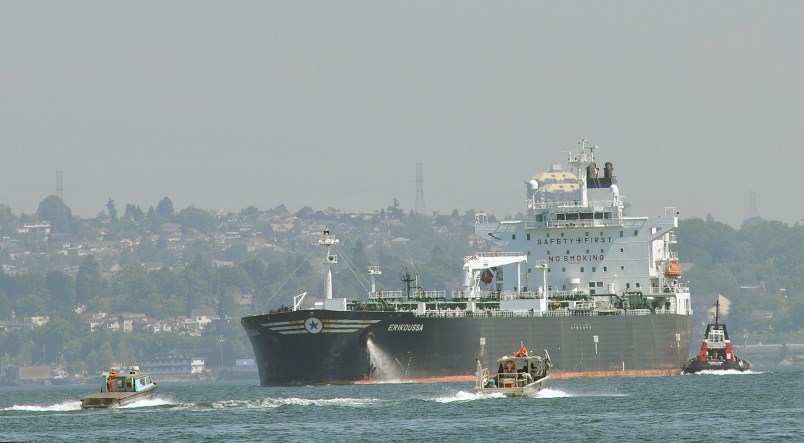The National Energy Board has concluded Kinder Morgan’s proposal to build a 987-kilometre oil pipeline from Alberta to Burnaby is in “the public interest” and recommends the federal government give the project the green light.
The board announced Thursday its approval for Kinder Morgan’s $6.8-billion Trans Mountain expansion project but cautioned that 157 conditions would first need to be met, including 58 related to the environment and 53 involving engineering and safety.
Conditions in the board’s 533-page report also state Kinder Morgan must continue its consultation with First Nations throughout the life of the project. Some First Nations, including the Tsleil-Waututh on the shores of Burrard Inlet, have opposed the project.
“The board is of the view that overall, with the implementation of Trans Mountain’s environmental protection procedures and mitigation, and the board’s recommended conditions, the project would not likely cause significant adverse environmental effects,” Dr. Robert Steedman, the board’s chief environment officer, told reporters in a video link Thursday from Calgary.
Steedman said the benefits of Kinder Morgan’s Trans Mountain pipeline project include considerable government revenues, increased access to diverse markets for Canadian oil and thousands of construction jobs and hundreds of long-term jobs directly related to the project.
The project calls for 89 per cent of the route to parallel Kinder Morgan’s existing pipeline built in the 1950s. Should the new pipeline be built, the number of barrels of oil shipped per day would increase from 300,000 to 890,000. That increase would mean a spike in oil tanker traffic in Vancouver’s waters.
Ian Anderson, president of Kinder Morgan Canada said in a release that Trans Mountain was pleased with the board's decision and believes the 157 conditions are "rigorous and appear to be achievable."
"Now, more than ever our project makes sense for Canada," said Anderson, noting close to 40 aboriginal groups located along the project and marine corridor in B.C. and Alberta have provided written letters of support for the project. "We have demonstrated the demand for much-needed access to global markets and how building this pipeline will bring both dollars and many thousands of jobs for communities in B.C. and Alberta at a time when our economy needs it most."
The City of Vancouver, the City of Burnaby and the provincial government have opposed the project. The trio of governments has argued that Kinder Morgan did not provide enough information to the board about emergency preparedness and response, in the event of an oil spill.
The report noted the board didn’t share the view of the municipalities or provincial government, with Steedman telling reporters the board found the likelihood of a major oil spill was “a very low probability.”
In a news conference held after the decision at a park near Jericho Beach, Mayor Gregor Robertson told reporters that he was disappointed with the board's decision and noted it left out some of the most critical pieces of analysis, including the project's effect on climate change and the economic damage an oil spill would cause in Vancouver.
"We will advocate vigorously in the months ahead to the prime minister and his cabinet to make sure that they turn down the Kinder Morgan proposal, in the best interest of Canada," Robertson said. "We've got a lot of work to do in the months ahead to prove our case, to make sure that Ottawa hears the voices from the West Coast about our waters, about our environment, about our economy and livelihood and quality of life."
B.C. Environment Minister Mary Polak reiterated the government's position Thursday on the project, saying it will only support new heavy-oil pipelines if five conditions are met.
"These conditions include the successful completion of the environmental review process, ensuring world-leading marine and land-based spill response, prevention and recovery systems are in place, ensuring legal requirements regarding aboriginal and treaty rights are addressed and First Nations are provided with the opportunities to participate in and benefit from a heavy-oil project," she said in a release. "And, finally, that British Columbia receives a fair share of the fiscal and economic benefits for any proposed heavy-oil projects."
The Greater Vancouver Board of Trade said it applauded the board's decision.
"The responsible development of market access for Canadian crude oil is of national importance," the board said in a release. "The current lack of 'midstream' infrastructure has turned Canada into a supplier held captive by our only customer [America], costing the economy $50 million each day."
The Wilderness Committe said it wasn't surprised by the board's decision.
"The NEB has ignored and wasted the time of countless communities, First Nations and individuals who have stood up to oppose the irresponsible pipeline proposal," said Peter McCartney, climate campaigner with the Wilderness Committee. "Kinder Morgan's project has no social licence and this pipeline will not be built."
The federal government announced this week that a three-person panel, including former Tsawwassen Chief Kim Baird, will review Kinder Morgan’s proposal. The panel’s recommendations in its report will not be binding. The federal cabinet is expected to make a final decision by December.
@Howellings



